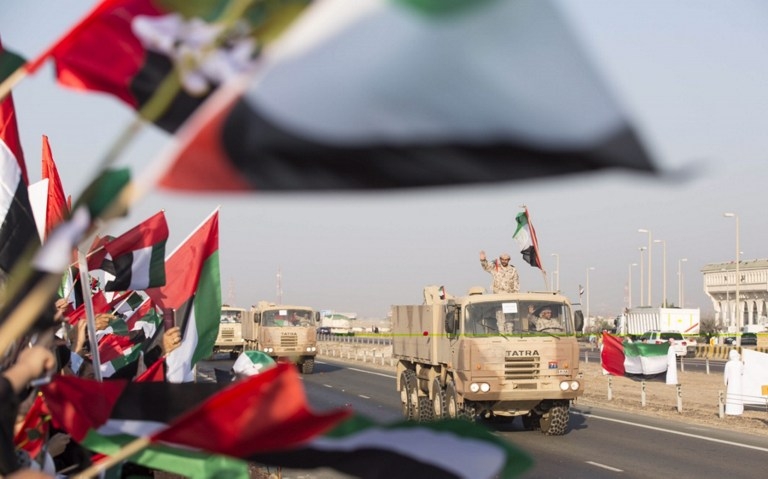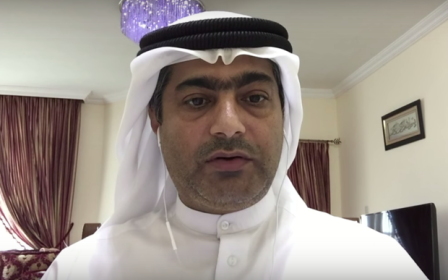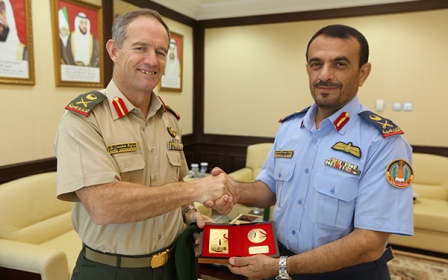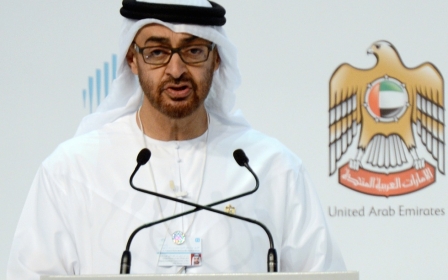The Gulf’s 'Little Sparta' has big military ambitions

The United Arab Emirates, an oil-rich Gulf federation of seven statelets including Dubai and Abu Dhabi, likes to think of itself as a country that has everything, including a Happiness Ministry. As Dubai's ruler and Emirati vice president Sheikh Mohammed bin Rashid al Maktoum put it: "National happiness isn't a wish. Plans, projects, programmes, indices will inform the work of our ministries to achieve happiness."
How can a country with an indigenous population of little more than a million people have such an emphatic military boot print?
Happiness, of course, means different things to different people, and while Sheikh Mohammed has turned his energies toward making a happy Dubai into a global tourism and business hotspot his counterpart, Khalifa bin Zayed bin Sultan Al Nahyan, president of the UAE, emir of Abu Dhabi and supreme commander of the Emirati defence force, sees happiness as something else. For Sheikh Khalifa, a Sandhurst graduate and lover of all things military, happiness is, to quote the Beatles, a warm gun.
That may help to explain the enthusiasm with which the UAE has thrown itself into a startling number of confrontations in the region and beyond, much to the delight of the United States military. In 2014, retired US General James Mattis, now Donald Trump's Secretary of Defense, called the UAE "Little Sparta," adding approvingly: "They're not just willing to fight – they're great warriors."
Swimming with the big fishes
Mattis' "great warriors" signed on very early to the US war against the Islamic State (IS) group in Syria. Al Dhafra airbase, about 20 miles (30km) south of Abu Dhabi, has approximately 3,500 US military personnel. The base has been used very heavily by the Americans in carrying out bombing raids, and the Emirates Air Force has racked up a significant number of strikes.
According to the Washington Post, besides the US, "Emirati fighters have conducted more missions against the Islamic State since the air war began than any other member of the multinational coalition."
The UAE has committed heavily to the Saudi-led war in Yemen, both in the air and even more significantly on the ground. Emirati troops were used to drive rebel forces out of Aden and Mukallah in southern Yemen. And the Emiratis have been busy in Libya supporting General Khalifa Haftar and in Afghanistan backing the Americans.
The latest move has seen the Emiratis sign deals with Somaliland and Puntland in the Horn of Africa to build deep-water ports and a military base. The deals, worth hundreds of millions of dollars, give the Emiratis a significant presence in a region that has already seen huge military buildups, including a mammoth US base in Djibouti, to say nothing of forces from France, Japan, Germany and now China. So Little Sparta is swimming with the big fish.
Granted the UAE is armed with the best weaponry and the most sophisticated technology that money can buy, but how can a country with an indigenous population of little more than a million people – roughly 90 percent of the total population of 9 million consists of expats and migrant workers – have such an emphatic military boot print?
Back-channel islands
Enter a chap who leaps straight out of a John LeCarre novel. Erik Prince is the brother of Betsy DeVos, Donald Trump's controversial education secretary. He also happens to be the founder of Blackwater, a company of mercenary soldiers that became infamous for the brutal killings of Iraqi civilians in 2007. Prince divested himself of Blackwater as a growing scandal swirled around the company.
But he popped up in the United Arab Emirates in 2011 and signed a whopping big contract worth $529m to provide the Emiratis with a mercenary force capable of carrying out special operations and protecting essential installations from terrorist attacks.
Intriguingly, Prince, who since his Blackwater days has striven for a very low profile, met on 11 January in the Seychelles with a Russian close to Vladimir Putin. The intent of the meeting was to set up a back-channel line of communication between the incoming Trump administration and the Russians.
The meeting was arranged, according to the Washington Post, by the UAE. It may be a meeting Prince wishes he never had, as the FBI is now reportedly investigating it as part of a broader probe into Russian interference in the 2016 presidential election.
Meanwhile, the Emiratis are coy about how many mercenaries are doing their fighting for them. Certainly when 45 soldiers were killed in a rocket attack in south Yemen in 2015, the nationalities of all those who died were left, at best, opaque in the Emirati media. However, it is likely that many of the casualties were from Latin America or Eritrea.
The Emiratis have also bought the services of retired high-ranking Australian officers to oversee the elite Presidential Guard, a story Middle East Eye's Rori Donaghy revealed in December 2015. As a military expert quoted in the article said: "Don't just buy the best equipment, buy talent too."
The dark side
And that Little Sparta has done. But there is a dark side, as there was in the ferociously militaristic and authoritarian original. It is one that clashes with the brilliantly promoted image of a tolerant, tourist and business friendly oasis that the Emirates, and principally Dubai and Abu Dhabi, have so successfully projected.
The UAE has relentlessly crushed human rights in its bid to silence dissent and stamp out what it sees as the pernicious influence of the Muslim Brotherhood. To that end, dozens of people have been sentenced to long terms in jail on evidence widely seen as flawed, much of it secured through coercion and torture.
A prominent academic and economist, Dr Naser al Ghaith, was given a 10-year prison sentence for criticising the Sisi government in Egypt, while Ahmed Mansoor, the winner of the prestigious 2015 Martin Ennals Award for Human Rights Defenders, was detained in March and awaits trial on unspecified charges.
None of this seems to have troubled the UAE's friends in the West. With brisk sales of military hardware, and a strong commitment to joint military action from the Emiratis, the thinking is why should it?
Playing hardball
Of course, there is the possibility that the UAE has bitten off more than it can chew. You need look no further than fellow Gulf Cooperation Council member Qatar for a precedent. Under its then prime minister and foreign minister Hamad bin Jassim, Qatar got itself entangled in all sorts of diplomatic initiatives it could not possibly deliver on.
Hamid bin Jassim (HbJ) was quickly shunted aside when a new emir came to power in 2013. Qatar's regional ambitions were significantly scaled down while HbJ retired to oversee his substantial business interests in London and elsewhere. Qatar left the big stage, reputation somewhat damaged, but not irretrievably so.
The Emiratis, on the other hand, are playing hardball with high-tech weaponry and guns for hire. Little Sparta has declared its preference for bombs over words. In a region already in turmoil, that's a dangerous game to play.
- Bill Law is a Middle East analyst and a specialist in Gulf affairs. He tweets @billlaw49.
The views expressed in this article belong to the author and do not necessarily reflect the editorial policy of Middle East Eye.
Photo: A handout image made available by United Arab Emirates News Agency (WAM) on 7 November 2015 shows Emiratis welcoming a UAE military convoy as it travels from the Al-Hamra military base to Zayed City after returning from Yemen (AFP/WAM)
New MEE newsletter: Jerusalem Dispatch
Sign up to get the latest insights and analysis on Israel-Palestine, alongside Turkey Unpacked and other MEE newsletters
Middle East Eye delivers independent and unrivalled coverage and analysis of the Middle East, North Africa and beyond. To learn more about republishing this content and the associated fees, please fill out this form. More about MEE can be found here.





